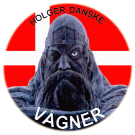 A reader named Marty Galyean sent us a new version of Holger Danske — he used one of my logos to make an animated .gif of the old Viking. I can’t display the image here, because the animation doesn’t loop, so you’d miss the point unless you scrolled to it immediately. Click this link to see Holger in action, and watch carefully!
A reader named Marty Galyean sent us a new version of Holger Danske — he used one of my logos to make an animated .gif of the old Viking. I can’t display the image here, because the animation doesn’t loop, so you’d miss the point unless you scrolled to it immediately. Click this link to see Holger in action, and watch carefully!Marty discovered Holger Danske at our Café Press store. We’ve been doing a brisk business there, but — strangely enough — most of our customers are Americans. Can it be true that the Danes are a little bit embarrassed by their national symbol? I met a Dane while I was in Copenhagen who acknowledged a slight distaste for the nationalism that Holger Danske represented.
For Americans, however, familiarity has not yet bred contempt, and they have eagerly picked up on the mythic symbol of Viking fortitude and vigilance.
I guess we just ain’t got no taste.

For those unfamilar with Holger Danske, his story is here.
[Nothing more.]

2 comments:
Listen, you are talking about a symbol 1300 years old - it is not something you go easily about - and it is also a symbol with a deeper meaning.
Let me try to explain. Grundtvig the philosopher in Denmark credited for the definition of modern danish identity has this theological/philosophical explanation:
The danish people is linked on a subconcious level - or a spiritual level. Something binds us together that we cannot explain, why is it that we find familiarity with danes whereever we go? because we share something. This something Grundtvig called "the soul of the people" - "folkesjælen". We share something on a spiritual level.
Now talking about Holger Danske; the point about him is that he represents folkesjælen. Danes are peaceful in times of peace, but pretty angry and fighters in times of war. So Holger Danske is not something you wear outside, but the spirit of your actions. So you should not look for Holger Danske in the practical symbols everywere, but you should what the danes do. There you will find Holger Danske.
It is not to say, that the socialist elite has not tried to get rid of all national symbols - well they have. And that is off cause also part of the reason why Holger Danske is out of fashion in some circles. But that does not change the character of the danish people, we are danes in culture and spirit - and that is where you find your Holger Danske.
So I have thought a bit about the fascination americans have for Holger Danske. And I see it, it is because he represents your cultural roots, as well as ours. Anglo Saxons are partially danes - Angles used to be a part of Denmark.
The danish culture is around 3 - 4000 years old. So it is a culture with very deep roots. And we still keep a lot of symbols important to the "Men of North". The graves of the Kings, the Rune Stones and so on.
Here is a picture of the Jellingesten - the "official" birth attest around 800 years old.
http://www.danskmiddelalder.dk/Jellingestenen(stor).htm
These ancient artifacts are yours as much as they are ours.
The text on the (largest) Jelling Stone reads :
"King Harald ordered this monument made in memory of Gorm, his father, and in memory of Thyra, his mother; that Harald who won for himself all of Denmark and Norway and made the Danes Christian."
And another thing: Danes usually don't wear badges or other symbols outside football stadiums. Such 'signals' tends to be interpreted as distinguishing oneself from others. As Einhejrer says, Danes are very much alike - members of the same tribe.
The last time such badges were in use were during the Nazi occupation. Danes then wore a small "King's Mark" as a sign of resistance.
But then again, if our present government should lose the next elections and the appeasers take over - Odin and Thor forbid - maybe the Baron's brilliant badge will be ubiquitous.
Post a Comment